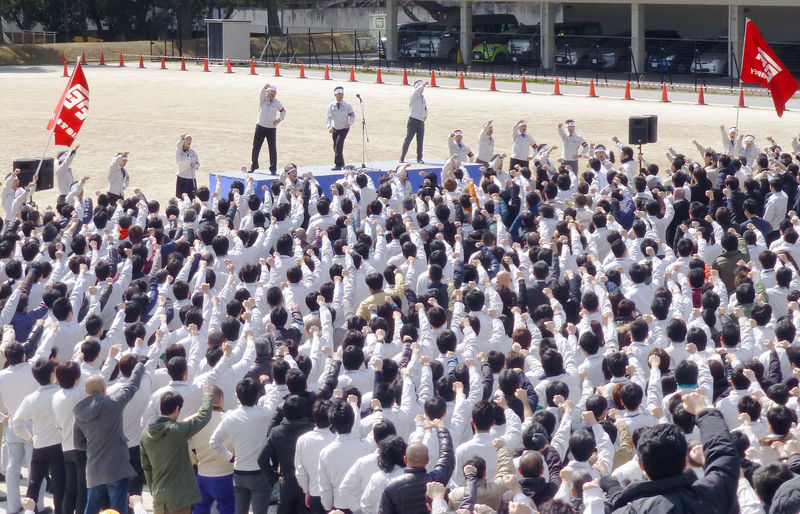By Tetsushi Kajimoto
TOKYO (Reuters) - Most major Japanese companies on Wednesday offered the lowest hike in base pay in four years, a setback for Prime Minister Shinzo Abe's campaign dubbed "Abenomics" to spur the long-sluggish economy.
Japan's annual "shunto" spring wage increases are a barometer of corporate confidence, and an indicator of whether consumer spending can get a needed boost - which this year's hikes are unlikely to supply.
"Wage growth is far from enough to accelerate economic growth and inflation," said Hisashi Yamada, chief economist at Japan Research Institute.
Toyota Motor Corp's (T:7203) base pay hike, traditionally a benchmark other companies use to gauge their increases, came to 1,300 yen ($11.34) a month - below last year's 1,500 yen.
The new hike is less than half the union's demand and far below the 4,000 yen given in 2015.
For a Toyota mid-level technician earning 360,000 yen a month, the pay increase works out to 0.36 percent. It can buy one bowl of rice with pork cutlet with miso sauce on top, a specialty of Nagoya, near the Toyota headquarters.
Despite sitting on piles of cash, Japanese companies are reluctant to raise wages as they are anxious about the economic outlook, currency swings and the chance U.S. President Donald Trump's trade policies will hurt export sales.
Major electric machinery makers such as Mitsubishi Electric (T:6503) and Panasonic Corp (T:6752), like Toyota, lowered their wage hikes for a second year. They are giving 1,000 yen, down from 1,500 yen in 2016 and 3,0000 yen the previous year.
Yamada and other analysts say that major companies on average are increasing base pay about 0.3 percent for the fiscal year starting in April, the smallest amount in four years.
SENIORITY SYSTEM
Total wage growth will be higher than the hikes now being announced: Workers will see roughly 2 percent more in their paychecks because their salary goes up automatically every year under Japan's seniority-based employment system.
Still, such an increase is below last year's 2.14 percent, and 2015's 2.38 percent, a 17-year high.
"I don't actually feel the economy is recovering or Abenomics is really bringing benefits," said a 33-year-old worker at a precision machinery maker in Nagano prefecture, west of Tokyo. The man, who requested anonymity, has housing loans to repay and two kids to raise.
From the early 2000s, base pay raises were virtually frozen for over a decade until Abe swept to power in late 2012 with a pledge to reboot the moribund economy. He urged companies to lift wages and they complied, to a degree.
Abe's government has intervened heavily in wage talks between management and labor unions who have lost bargaining power in the face of declining unionization.
In Japan, labor unions, which this year kept their demands unchanged from 2016, tend to attach greater importance to job security and loyalties to their company instead of aggressively seeking higher wages.
"The government hopes that wage hikes are firmly realized based on corporate profits and that the trend of wage hikes will spread to small firms and non-regular workers," Chief Cabinet Secretary Yoshihide Suga told reporters on Wednesday.
LIMP SPENDING
Abe wants healthy wage hikes to drive a virtuous growth cycle in which consumer spending and business investment rise, in turn lifting profits and wages. The central bank also wants to see higher wages lift prices and enable Japan to break out of its deflationary rut.
But the latest meager gains bode poorly for that scenario.
In the face of rising costs of living and uncertainty about the future, ordinary workers opt for saving rather than spending.
"It's hard to make ends meet and rising vegetable prices are driving up the cost of living," said a 22-year-old female factory worker at a watchmaker in central Japan.
"I'll set any increased income aside for food expenses rather than spending for recreation."
